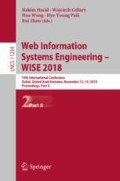Abstract
With the advent of ‘big data’, various new methods have been proposed, to explore data in several domains. In the domain of learning (and e-learning, in particular), the outcomes lag somewhat behind. This is not unexpected, as e-learning has the additional dimensions of learning and engagement, as well as other psychological aspects, to name but a few, beyond ‘simple’ data crunching. This means that the goals of data exploration for e-learning are somewhat different to the goals for practically all other domains: finding out what students do is not enough, it is the means to the end of supporting student learning and increasing their engagement. This paper focuses specifically on student engagement, a crucial issue especially for MOOCs, by studying in much greater detail than previous work, the engagement of students based on clustering students according to three fundamental (and, arguably, comprehensive) dimensions: learning, social and assessment. The study’s value lies also in the fact that it is among the few studies using real-world longitudinal data (6 runs of a course, over 3 years) from a large number of students.
Access this chapter
Tax calculation will be finalised at checkout
Purchases are for personal use only
References
Antonenko, P.D., et al.: Using cluster analysis for data mining in educational technology research. Educ. Tech. Res. Dev. 60(3), 383–398 (2012)
Cristea, A.I., et al.: Earliest predictor of dropout in MOOCs: a longitudinal study of FutureLearn courses. Presented at the 27th International Conference on Information Systems Development (ISD2018), Lund, Sweden, 22 August 2018
Cristea, A.I., et al.: How is learning fluctuating? FutureLearn MOOCs fine-grained temporal analysis and feedback to teachers and designers. Presented at the 27th International Conference on Information Systems Development (ISD2018), Lund, Sweden, 22 August 2018
Csiksczentmihalyi, M., et al.: Flow: the psychology of optimal experience. Aust. Occup. Ther. J. 51(1), 3–12 (2004)
Ferguson, R., Clow, D.: Examining engagement: analysing learner subpopulations in massive open online courses (MOOCs). Presented (2015)
Guo, P.J., et al.: How video production affects student engagement: an empirical study of MOOC videos. Presented (2014)
Henrie, C.R., et al.: Measuring student engagement in technology-mediated learning: a review. Comput. Educ. 90, 36–53 (2015)
Kodinariya, T.M., Makwana, P.R.: Review on determining number of cluster in K-means clustering. Int. J. 1(6), 90–95 (2013)
Laurillard, D.: Rethinking University Teaching: A Conversational Framework for the Effective Use of Learning Technologies. London, RoutledgeFalmer (2002)
MacQueen, J., et al.: Some methods for classification and analysis of multivariate observations. In: Proceedings of the Fifth Berkeley Symposium on Mathematical Statistics and Probability, Oakland, CA, USA, pp. 281–297 (1967)
Marks, H.M.: Student engagement in instructional activity: patterns in the elementary, middle, and high school years. Am. Educ. Res. J. 37(1), 153–184 (2000)
Al Mamun, M.A., et al.: Factors affecting student engagement in self-directed online learning module. In: The Australian Conference on Science and Mathematics Education (Formerly UniServe Science Conference), p. 15 (2017)
Shernoff, D.J., et al.: Student engagement in high school classrooms from the perspective of flow theory. In: Csikszentmihalyi, M. (ed.) Applications of Flow in Human Development and Education: The Collected Works of Mihaly Csikszentmihalyi, pp. 475–494. Springer, Dordrecht (2014). https://doi.org/10.1007/978-94-017-9094-9_24
Shi, L., et al.: Towards understanding learning behavior patterns in social adaptive personalized E-learning systems. In: The 19th Americas Conference on Information Systems, pp. 1–10. Association for Information Systems, Chicago (2013)
Shi, L., Cristea, A.I.: Demographic indicators influencing learning activities in MOOCs: learning analytics of FutureLearn courses. Presented at the 27th International Conference on Information Systems Development (ISD2018), Lund, Sweden, 22 August 2018
Sinatra, G.M., et al.: The challenges of defining and measuring student engagement in science. Educ. Psychol. 50(1), 1–13 (2015)
Author information
Authors and Affiliations
Corresponding author
Editor information
Editors and Affiliations
Rights and permissions
Copyright information
© 2018 Springer Nature Switzerland AG
About this paper
Cite this paper
Shi, L., Cristea, A.I. (2018). In-depth Exploration of Engagement Patterns in MOOCs. In: Hacid, H., Cellary, W., Wang, H., Paik, HY., Zhou, R. (eds) Web Information Systems Engineering – WISE 2018. WISE 2018. Lecture Notes in Computer Science(), vol 11234. Springer, Cham. https://doi.org/10.1007/978-3-030-02925-8_28
Download citation
DOI: https://doi.org/10.1007/978-3-030-02925-8_28
Published:
Publisher Name: Springer, Cham
Print ISBN: 978-3-030-02924-1
Online ISBN: 978-3-030-02925-8
eBook Packages: Computer ScienceComputer Science (R0)

